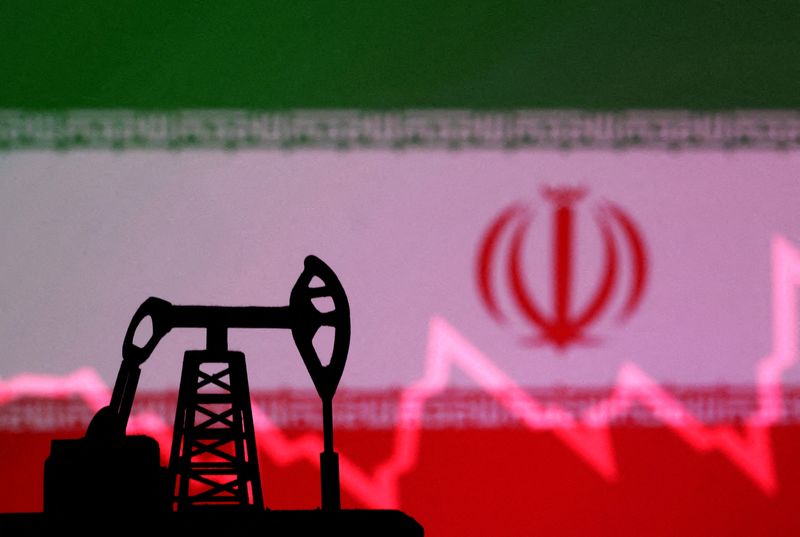By Daphne Psaledakis
WASHINGTON (Reuters) - The United States has warned it will impose new sanctions on Iran following its unprecedented attack on Israel.
U.S. Treasury Secretary Janet Yellen on Tuesday said new sanctions on Tehran - which could be focused on reducing the country's capacity to export oil - would come within days. Congressional Republicans also are considering a series of bills on Iran.
Here are details about existing measures against Iran and what the U.S. might do next:
WHAT IS THE SCOPE OF EXISTING U.S. SANCTIONS ON IRAN?
Washington's sanctions on Iran already ban nearly all U.S. trade with the country, block the government's assets in the U.S. and prohibit U.S. foreign assistance and arms sales, according to the Congressional Research Service (CRS).
Thousands of people and companies, both Iranian and foreign, have been targeted under the sanctions program as Washington has sought to constrain Iran's government and change its behavior, the CRS said in a report last year.
U.S. concerns have included Iran's nuclear program, human rights abuses and its support for groups the U.S. sees as terrorists.
"U.S. sanctions on Iran are arguably the most extensive and comprehensive set of sanctions that the United States maintains on any country," the CRS said.
WHAT MORE CAN THE U.S. DO?
Peter Harrell, a former National Security Council official, said U.S. options for further sanctions include targeting the flow of Iranian oil and playing a more aggressive game of "Whac-A-Mole" to go after Iran's front companies and financiers.
One of the most significant moves would be for Washington to get the European Union and other western allies to impose multilateral sanctions on Tehran, he said, as most of the sanctions in place against Iran currently are U.S. measures.
Former President Donald Trump reinstated U.S. sanctions that were eased under an international deal on Tehran's nuclear program when he withdrew in 2018.
"We have to be realistic that from a U.S. perspective, while there are always more sanctions you can impose, we are in a world of diminishing actual economic pressure because we have so many sanctions already in place," Harrell said.
WHAT IS CONGRESS CONSIDERING?
House Republican leaders have accused President Joe Biden of failing to enforce existing measures and said they would take up a series of bills to sharpen sanctions on Iran.
Among them is legislation that would increase congressional oversight of sanctions waivers, tighten restrictions on the export of U.S. goods and technology to Iran and require the administration to ensure humanitarian exemptions to the sanctions do not facilitate acts of terrorism or the proliferation of weapons of mass destruction.
There was no immediate indication of when, if ever, any of the measures would become law, which would require passage by the Democratic-led Senate and the signature of Democratic President Joe Biden.
The House late on Monday overwhelmingly passed a bill called the Iran-China Energy Sanctions Act, which would expand sanctions on Iran by requiring annual reports to determine whether Chinese financial institutions have participated in transactions on Iranian oil. It would ban U.S. financial institutions from having accounts for any Chinese entities that engage in those deals.
The bill faces an uncertain future in the Senate.
The Democratic-led Senate may consider its own legislation. The Senate Foreign Relations Committee passed a bill on Tuesday that would impose measures on foreign ports and refineries that process oil exported from Iran in violation of U.S. sanctions, after a companion bill passed last year in the House.
The Biden administration has imposed sanctions on hundreds of people and entities in Iran-related action since 2021.
WHAT ARE THE KEY PARTS OF THE CURRENT MEASURES?
U.S. sanctions on Iran have targeted its nuclear capabilities, energy and defense sectors, government officials, banks and other aspects of Iran's economy: * The U.S. has imposed sanctions on the Atomic EnergyOrganization of Iran and other companies it says are linked toIran's nuclear program, as well as dozens of banks, includingthe Central Bank of Iran. * Washington has also targeted the National Iranian OilCompany, Ministry of Petroleum and others in an effort to stemrevenue Iran receives from its energy sector, and has targetedcompanies outside Iran - including in China and the United ArabEmirates - over the trade of Iranian petrochemicals andpetroleum despite U.S. sanctions. * The U.S. has imposed several sets of sanctions on Iran'sRevolutionary Guard Corps (IRGC), its overseas Quds Force andthe Ministry of Defense and Armed Forces Logistics, as well aspeople and entities it said were associated with them.Washington has designated the IRGC and Quds Force as ForeignTerrorist Organizations. * Iranian government officials, including President EbrahimRaisi, have been targeted.
